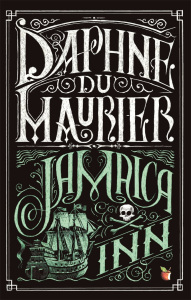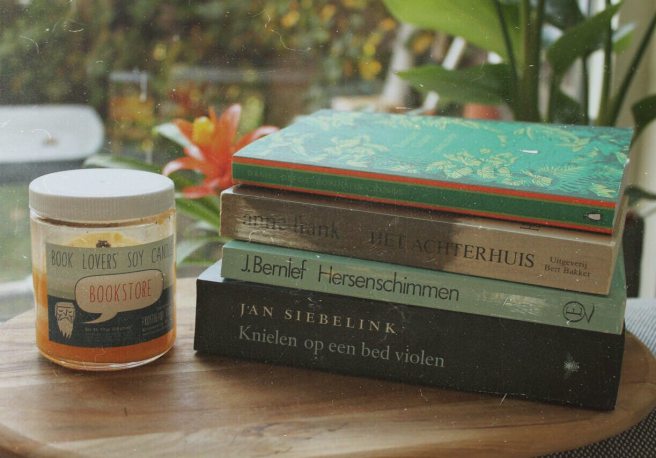
//published 1935//
Overall, I wanted to like Jamaica Inn, but just found it too, too depressing.
Mary’s mother has died and Mary is going to live with her only remaining relative, her mother’s sister Patience. Aunt Patience is married to an innkeeper named Joss. But when Mary (who is a young woman of 23, not a child, by the way) arrives at Jamaica Inn, she finds it to be a frightening and lonely place that discourages visitors. Joss is a strong, terrible man, and Aunt Patience is a shadow of her former self. As the story progresses, Mary discovers various evil and terrible things going on around the inn, but feels unable to speak out against them because of how the destruction of Joss would devastate Patience.
Many of the descriptions are rather melodramatic, but excellent nonetheless. Du Maurier has a knack of describing people in a way that makes them quite easy to picture – perhaps aided by the fact that nearly everyone in this book is practically a caricature.
In both Rebecca and My Cousin Rachel, we are given a first person perspective from a possibly unreliable narrator. Much of tension from both of those books is not knowing how much of what we hear is actual truth, and how much of it is simply in the mind of the narrator. But in Jamaica Inn, the story is much more straightforward, a more traditional Gothic novel, with smugglers and dark, sweeping moors, and an innocent young woman caught up in circumstances beyond her control. It wasn’t exactly boring, but it almost was. While in Rebecca and My Cousin Rachel I was constantly guessing as the guilt and innocence to the very end, I really had Jamaica Inn figured out about a third of the way through; the book felt almost formulaic.
Throughout, I couldn’t tell if du Maurier was trying to make a point about the situation of women in society or what, but she constantly, and I do mean constantly, harps on how hopeless and almost pointless the existence of women is, because they are so dependent on men. Of Aunt Patience she says –
“You mustn’t mind your uncle Joss,” [Aunt Patience] said, her manner changing suddenly, fawning almost, like a whimpering dog that has been trained by constant cruelty to implicit obedience, and who, in spite of kicks and curses, will fight like a tiger for its master.
And really, that sums up the way both sexes are portrayed throughout. The women – downtrodden, hopelessly bound by love and loyalty; the men – vacillating between cruelty and indifference.
Even Mary herself, who claims that she will always be independent and strong, and will never fall in love or put herself into a place where a man has control over her, falls in love “against her will” –
And there, in spite of herself, came [his] face again, with growth of beard like a tramp, and his dirty shirt, and his bold offensive stare. He lacked tenderness; he was rude; and he had more than a streak of cruelty in him; he was a thief and a liar. He stood for everything she feared and hated and despised; but she knew she could love him. Nature cared nothing for prejudice. Men and women were like the animals on the farm at Helford, she supposed; there was a common law of attraction for all living things, some similarity of skin or touch, and they would go to one another. This was no choice of the mind.
Later in the same chapter she is thinking about how back at home she would see people in love, but after they married –
…when the lad came home at evening tired from his work in the fields, and calling sharply that his supper was burnt, not fit for a dog, while the girl snapped back at him from the bedroom overhead, her figure sagging and her curls gone, pacing backward and forward with a bundle in her arms that mewed like a cat and would not sleep. There was no talk then of the moonlight on the water. No, Mary had no illusions about romance. Falling in love was a pretty name for it, that was all.
Just… ugh. So hopeless, not just about love, but about life – that all we are is unthinking animals who know nothing better than to find someone to whom we have a spark of attraction that we may breed – no hope of any kind of long-lasting affection or companionship – just drudgery and darkness.
And that’s what this book was, consistently, throughout every page. Drudgery and darkness. Complete hopelessness. In the end, Mary goes off with with this man who stands “for everything she feared and hated and despised” – and there is no sign whatsoever that he is not all of the things she lists off in that paragraph. And so Mary, despite knowing that her life will probably be miserable, purposefully chooses to go with him! I had already lost all my respect for Mary about halfway through the book; for all her claims to be strong and saucy, she really isn’t terribly smart and is already completely resigned to a life just as miserable as Aunt Patience’s (even though Mary spends a great deal of time despising her Aunt Patience for her loyalty to Joss).
In the end, du Maurier leaves us with nothing. Christianity is “built upon a fairy tale. Christ himself is a figurehead, a puppet thing created by man himself.” Humans are nothing more than animals who can never expect to be anything better. Women will forever be subservient to men because they will always choose to be loyal to a man, even if he is cruel – which he will be, because all men are so instinctively, desiring nothing more than to crush all who are weaker than they are.
The picturesque descriptions of the moors and the attempt at a mystery were not enough to overcome the darkness and hopelessness of this story for me. 2/5 and not recommended.
However, I will say that both Rose Reads Novels and That’s What She Read are more generous than I am, so you may want to check out their reviews for some balance. ;-)
 #13 for #20BooksofSummer!
#13 for #20BooksofSummer!
(#12 will be reviewed at the end of the month in July’s minireviews.)
Advertisements Share this:




